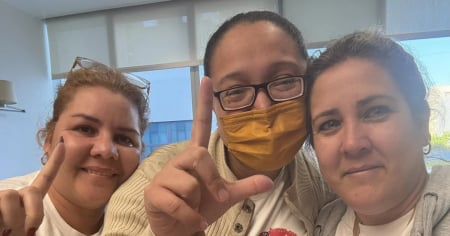For Cuban Yilian Martínez, as for many in a similar situation, December does not bring only lights and carols, but also a weight in the heart that seems to grow with each passing day. “No matter how much we send, no matter how much we give, we will never feel that joy that only comes when you are with family,” she confessed in a video shared on her TikTok account, @yilian8508.
From Tampa Bay, Florida, Yilian shared how this season, which is often a time of joy for many, becomes a painful reminder for those, like her, living under the I220A immigration status in the United States. Unable to travel or reunite with her loved ones, she asserts that December is "the month that crushes my heart."
“We will be behind a screen, wishing the earth would swallow us,” she continued in her testimony, making it clear how difficult it is for her and others in her situation to face the holidays away from home. Despite the discouragement, she clings to hope: “We will have faith that this will pass soon and that afterward it will only be a bad memory.”
In the comments, some people going through similar experiences immediately identified with her words. "That's exactly it, almost three years here without being able to see my mother and without hope," wrote one user. Others expressed their support with heart and tear emojis, making it clear that Yilian's pain is not unique but shared by many.
Frequently Asked Questions about the Emotional Impact of Migration and the I-220A Status for Cubans in the United States
What is the I-220A immigration status and how does it affect Cubans in the United States?
The I-220A is a parole document that allows migrants to remain in the United States while their immigration status is being determined. For many Cubans, it represents a legal limbo, with no possibility of obtaining permanent residency or safely returning to Cuba.
How does family separation emotionally impact Cubans in the U.S.?
Family separation has a deep emotional impact on Cuban emigrants, who often suffer from nostalgia, sadness, and anxiety. Holiday seasons, such as December, intensify these feelings as they remind them of the absence of their loved ones.
What challenges do Cubans with I-220A face in the U.S.?
Cubans with I-220A face multiple challenges, such as legal uncertainty, lack of access to permanent residency, and constant fear of deportation. Additionally, they must adapt to the economic and cultural differences in the United States, which can be a complex and stressful process.
What are the common feelings among Cubans who live far from their families during the holidays?
During the festivities, many Cubans experience feelings of sadness and loneliness due to the distance from their families. Celebrations, which are usually times of togetherness, turn into painful reminders of their separation, intensifying their desire to reunite with their loved ones.
Filed under:
